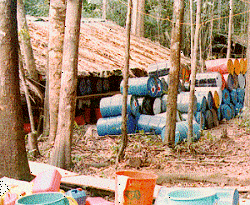Focus on Clicktivism: The New “Social” Environment
By Colin Kimberlin
Staff Writer
When it comes to international issues of the environment, social media does not come to mind as the first policing force. Yet in the past few months, social media sites such as Instagram, Twitter, and Tremr.com, as well as their users, have taken it upon themselves to bring the Volkswagen scandal to the forefront of international social media.
Volkswagen, the second largest car manufacturer in the world, has tumbled down the rungs of environmental social media in the past month. Recently, it has come to the international community’s attention that this European-based corporation has been rigging U.S. emissions by creating “cheat” software, known as defeat devices, to comply with Environmental Protection Agency (EPA) regulations.
After Volkswagen officially announced the scandal was in fact true, the corporation experienced a plunge in stock prices and reputation. However, that was not all that was in store for the company. Within five hours of the announcement, the Volkswagen hashtag on Twitter accumulated over 3,000 mentions and the brand’s social media following actually grew as a result.
Yet according to recent claims on social media, Volkswagen programmed their model 2009 to 2015 diesel vehicles to meet United States standards of nitrogen oxide emission levels during the initial testing for each vehicle. Eventually, when the vehicles were road tested, the EPA noticed the discrepancies; driving released 35 times higher emissions than the initial test’s results.
This illegal programming was classified as a defeat device by the EPA, which is an infraction on the U.S. Clean Air Act. Over 11 million cars internationally and 500,000 in the United States alone had been affected by such defeat devices. The original discovery of these test discrepancies stemmed from regional emission studies around the country in 2014, which was conducted by the International Council on Clean Transportation. Again, once the information became public, social media took off.
Following the information’s debut, it took to Instagram under the hashtag “dieselgate.” By October 2, the hashtag was used more than 1,000 times. This increase of social media presence lead to over $7.3 billion in costs due to loss in stock value and the price of promising to refit all recalled vehicles with corrected software.
Although this issue seems to be breaking news, it was discovered over a year ago. Back in May of 2014, multiple class action lawsuits and numerous regulatory investigations in multiple countries had been placed against Volkswagen. So why did the issue just become relevant? The answer is social media.
Not only did the users of Instagram and Twitter play a particularly large role in “#dieselgate,” but the claim under which social media has the ability to actively campaign and advocate through an internet-based medium. Certain users took to their pages to mock Volkswagen, specifically @fmarciuliano, who wrote, “All I know is Herbie would never have lied about this emissions test results. You let him down, #Volkswagen.”
Social media is beginning to play a larger role in what constitutes actual “news.” A user speaks, and the media listens. Rick Miller, Vice President of Customer Insights at the social media management company, Network Insights, understands this clearly when he stated on TheStreet.com, “Social media’s candid nature allows users to be honest, and as a result, express their opinions of brands. Knee-jerk or not, consumers are talking on social media, and while immediate responses to scandals such as the Volkswagen emissions allegations aren’t the only factors to pay attention to when determining the health of the brand, these conversations are real and should be taken into account.”
So the next time you gloss over Instagram or read a few tweets, remember that although social media may be creating a distorted realm where emotions begin to blend with fact about precise topics, it does not downplay the value infused within a medium that is internationally arching.





